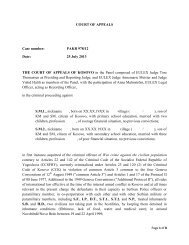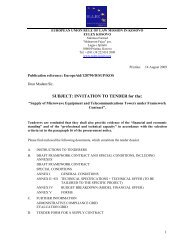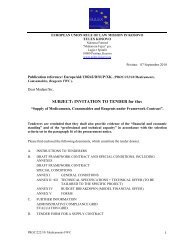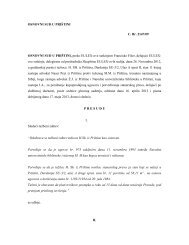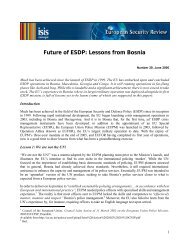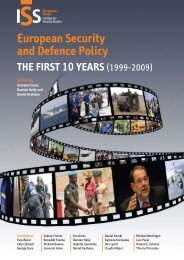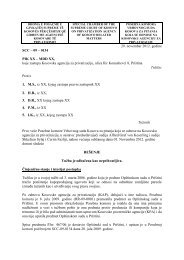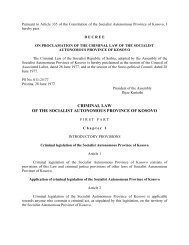Organized Crime in the Western Balkans Trafficking in drugs ... - Eulex
Organized Crime in the Western Balkans Trafficking in drugs ... - Eulex
Organized Crime in the Western Balkans Trafficking in drugs ... - Eulex
Create successful ePaper yourself
Turn your PDF publications into a flip-book with our unique Google optimized e-Paper software.
<strong>Organized</strong> <strong>Crime</strong> <strong>in</strong> <strong>the</strong> <strong>Western</strong> <strong>Balkans</strong>Dejan Anastasijevic 1The author provides a short history and a general overview of <strong>the</strong> situation and trends <strong>in</strong> <strong>the</strong> threemost vibrant and resilient sectors of organized crime <strong>in</strong> <strong>the</strong> <strong>Western</strong> <strong>Balkans</strong> – illicit <strong>drugs</strong>, weapons,and human traffick<strong>in</strong>g – and aims to assess <strong>the</strong> government’s efforts (or <strong>the</strong> lack of it). The authorprovides also recommendations for <strong>the</strong> future. He concludes that <strong>the</strong> three ma<strong>in</strong> sectors of organizedcrime activities – traffick<strong>in</strong>g <strong>in</strong> <strong>drugs</strong>, human be<strong>in</strong>gs, and weapons – are <strong>in</strong>tertw<strong>in</strong>ed, and all three aredeeply embedded <strong>in</strong> <strong>the</strong> pervasive culture of corruption <strong>in</strong> <strong>the</strong> region and that <strong>the</strong>re is nocomprehensive strategy to address <strong>the</strong> problem, nei<strong>the</strong>r locally, nor <strong>in</strong> <strong>the</strong> EU, although organizedcrime <strong>in</strong> <strong>the</strong> <strong>Western</strong> <strong>Balkans</strong> is widely recognized as <strong>the</strong> ma<strong>in</strong> threat aga<strong>in</strong>st stability <strong>in</strong> <strong>the</strong> regionand <strong>in</strong> Europe.I. IntroductionSix years after <strong>the</strong> end of <strong>the</strong> Yugoslav wars, it can be safely asserted that <strong>the</strong> potential for large scalearmed conflicts <strong>in</strong> <strong>the</strong> <strong>Western</strong> <strong>Balkans</strong> is, by large, dim<strong>in</strong>ished. However, <strong>the</strong> states which emergedfrom Yugoslavia’s ru<strong>in</strong>s are suffer<strong>in</strong>g from chronic political <strong>in</strong>stability, high unemployment rate, andlack of rule of law. That, along with widespread corruption, unresolved ethnic issues, and porousborders makes <strong>the</strong>m susceptible to both terrorism and organized crime. Moreover, <strong>the</strong> lawenforcement structures <strong>in</strong> <strong>the</strong> region are largely relics from <strong>the</strong> war period, unaccustomed todemocratic environment. Designed to serve autocratic regimes <strong>in</strong> deep secrecy, <strong>the</strong>y rema<strong>in</strong> deeplysuspicious towards any attempt to reform and accountability.Also it should be noted that <strong>in</strong> Serbia and Montenegro, <strong>the</strong> regime of Slobodan Milosevic was not onlycorrupted, autocratic, and crim<strong>in</strong>alized: it was a crim<strong>in</strong>al regime, whose whole security sector wasdeeply <strong>in</strong>volved not just <strong>in</strong> war crimes, but also <strong>in</strong> classic forms of organized crime: drug and weaponstraffick<strong>in</strong>g, extortion, kidnapp<strong>in</strong>gs, and targeted assass<strong>in</strong>ations. The security systems <strong>in</strong> o<strong>the</strong>rrepublics, sadly, replicated this model to various degrees throughout most of <strong>the</strong> 90’s. Although <strong>the</strong>reare now ongo<strong>in</strong>g efforts <strong>in</strong> all former Yugoslav republics to reform <strong>the</strong>se structures <strong>in</strong> accordance toEuropean standards, most observers agree that <strong>the</strong>se reforms are, at best, only mildly effective, and atworst <strong>the</strong>y are counterproductive. In Serbia, for example, <strong>the</strong> Security Information Agency (BIA),which previously operated under <strong>the</strong> auspices of <strong>the</strong> M<strong>in</strong>istry of Interior, was “reformed” by def<strong>in</strong><strong>in</strong>git as an “<strong>in</strong>dependent” agency, effectively plac<strong>in</strong>g it out of government’s jurisdiction and control. Thesituation <strong>in</strong> Macedonia is not much better, and Croatia, despite some improvements, is still struggl<strong>in</strong>gto dismantle Franjo Tudjman’s malignant legacy.It is even worse <strong>in</strong> Bosnia-Herzegov<strong>in</strong>a and Kosovo, where <strong>the</strong> <strong>in</strong>ternational effort <strong>in</strong> nation-build<strong>in</strong>gyields mixed results <strong>in</strong> conta<strong>in</strong><strong>in</strong>g terrorism and organized crime. In both countries, overlapp<strong>in</strong>g1 Dejan Anastasijevic is senior <strong>in</strong>vestigative reporter for <strong>the</strong> Belgrade-based VREME weekly, and free-lanceBalkan correspondent for TIME magaz<strong>in</strong>e. He is work<strong>in</strong>g also for <strong>the</strong> Belgrade Centre for Human Rights2
harsher sentences, and for <strong>the</strong> first time, <strong>the</strong> mere possession of any quantity of illegal <strong>drugs</strong> hasbecome a crim<strong>in</strong>al offence. Even more importantly, as of this year, <strong>the</strong> Customs Services is grantedwidened powers, <strong>in</strong>clud<strong>in</strong>g <strong>the</strong> authority to conduct phone tapp<strong>in</strong>g, and to <strong>in</strong>filtrate its agents <strong>in</strong>tocrim<strong>in</strong>al r<strong>in</strong>gs (until recently, only BIA and Military Intelligence and Counter Intelligence Serviceshad <strong>the</strong> authority and means for electronic surveillance). Also, <strong>the</strong> Department for Combat<strong>in</strong>g<strong>Organized</strong> <strong>Crime</strong> (Odeljenje za borbu protiv organizovanog krim<strong>in</strong>ala, or OBPOK) has announcedplans to boost <strong>the</strong> number of agents <strong>in</strong> its anti-drug division from about dozen to 50, as well asestablish<strong>in</strong>g regional offices throughout <strong>the</strong> country (right now, OBPOK has no branch offices outside<strong>the</strong> capital).Lately, Serbian police and customs have had more success <strong>in</strong> <strong>in</strong>tercept<strong>in</strong>g hero<strong>in</strong> shipments: more than360 kilograms were seized dur<strong>in</strong>g <strong>the</strong> first six months of 2006, more than twice than <strong>in</strong> two previousyears. Still, <strong>the</strong> street price of hero<strong>in</strong> <strong>in</strong> Serbia – between 15 and 20 euros per gram – <strong>in</strong>dicates that <strong>the</strong>drug is both abundant and easily available, and <strong>the</strong> fact that this price has rema<strong>in</strong>ed stable for <strong>the</strong> pastfive years proves that much more needs to be done <strong>in</strong> order to reduce <strong>the</strong> hero<strong>in</strong> flow through Serbiatowards <strong>the</strong> <strong>Western</strong> markets.Bosnia-Herzegov<strong>in</strong>a, which is <strong>the</strong> next country on <strong>the</strong> Balkan hero<strong>in</strong> route, also has a poor record <strong>in</strong>conta<strong>in</strong><strong>in</strong>g <strong>the</strong> drug traffick<strong>in</strong>g. There is no specialized drug enforcement agency, nei<strong>the</strong>r on <strong>the</strong> statelevel, nor with<strong>in</strong> <strong>the</strong> two Bosnian entities: Republika Srpska and The Bosnia-Herzegov<strong>in</strong>a Federation.The bulk of <strong>the</strong> effort to conta<strong>in</strong> drug dealers and smugglers is left over to customs and local –municipal and cantonal – police, which has nei<strong>the</strong>r <strong>the</strong> cadre nor <strong>the</strong> equipment to deal with organizedcrime r<strong>in</strong>gs. There is also no available statistic on how much <strong>drugs</strong> were seized <strong>in</strong> <strong>the</strong> republic <strong>in</strong>recent period.Bosnian borders with both Serbia and Croatia are porous and cross<strong>in</strong>g <strong>the</strong>m can be, quite literary, awalk <strong>in</strong> <strong>the</strong> park. So, once a hero<strong>in</strong> shipment reaches Serbia, mov<strong>in</strong>g it to Croatia, ei<strong>the</strong>r directly orthrough Bosnia is not much of a challenge. Although Croatia shared many problems with Serbiadur<strong>in</strong>g <strong>the</strong> reign of authoritarian President Franjo Tudjman, <strong>the</strong> country has s<strong>in</strong>ce shown a significantprogress <strong>in</strong> suppress<strong>in</strong>g organized crime. Apart from Romania, Croatia is <strong>the</strong> only Balkan country witha National Strategy on Suppress<strong>in</strong>g Traffick<strong>in</strong>g and Abuse of Illegal Drugs, which b<strong>in</strong>ds toge<strong>the</strong>rdifferent government, <strong>in</strong>ternational, and non-governmental <strong>in</strong>stitutions. Serbian government hasvowed to forge such a strategy, as well as <strong>the</strong> agency to implement it, by <strong>the</strong> end of this year, butdelays are expected due to current political <strong>in</strong>stability.Although hero<strong>in</strong> trade rema<strong>in</strong>s <strong>the</strong> largest and most malignant problem <strong>in</strong> <strong>the</strong> <strong>Western</strong> <strong>Balkans</strong>, o<strong>the</strong>r<strong>drugs</strong> are also present. The abuse of coca<strong>in</strong>e and amphetam<strong>in</strong>e-type-stimulants (ATS), such as ecstasy,amphetam<strong>in</strong>e, and methamphetam<strong>in</strong>e, is on <strong>the</strong> rise, and cannabis is omnipresent. In February 2003,police raided several pharmaceutical factories near Belgrade, discover<strong>in</strong>g a large quantity of ATS(mostly amphetam<strong>in</strong>e). The <strong>in</strong>vestigation revealed that <strong>the</strong> r<strong>in</strong>gleader, doctor Milan Zarubica, wasproduc<strong>in</strong>g tons of stimulants under <strong>the</strong> pretext of research and development of a new drug, andexported <strong>the</strong>m throughout Europe. Zarubica was sentenced to 12 years <strong>in</strong> jail, and fourteen of hisassociates also got lengthily jail sentences. S<strong>in</strong>ce <strong>the</strong>n, most of ATS found <strong>in</strong> <strong>the</strong> <strong>Balkans</strong> aremanufactured outside <strong>the</strong> region and smuggled to <strong>the</strong> <strong>Balkans</strong> for local consumption; cannabis is bothgrown and consumed locally, but <strong>the</strong> presence of coca<strong>in</strong>e, often found <strong>in</strong> smaller quantities <strong>in</strong> hero<strong>in</strong>shipments, is a cause for concern.Ano<strong>the</strong>r cause for concern is <strong>the</strong> grow<strong>in</strong>g local consumption of opiates. The steady flow of cheaphero<strong>in</strong> through <strong>the</strong> region, coupled by high unemployment rate and poor social care, all contribute tospread<strong>in</strong>g of addiction among 16 to 25 years old. This especially applies to Kosovo, where <strong>the</strong>collapse of traditional society after <strong>the</strong> conflict, as well as <strong>the</strong> general lack of <strong>the</strong> rule of law, makes<strong>the</strong> young particularly vulnerable to drug dealers. In Bosnia, too, <strong>the</strong> situation can be described asdramatic, and <strong>in</strong> some municipalities, like Travnik, it is estimated that some 10 % of 15 to 30 year olds6
are addicted to hero<strong>in</strong>. Despite all this, local authorities show only token effort to fight this scourge,and when <strong>the</strong>y do, <strong>the</strong>y usually limit <strong>the</strong>m to short-lived publicity campaigns, sometimes coupled withad hoc police raids aimed at round<strong>in</strong>g up small time drug dealers. The overall social and economiccost of such negligence, through <strong>the</strong> destruction of young lives, <strong>the</strong> spread<strong>in</strong>g of HIV/AIDS, and <strong>the</strong>corrosive corruption, is impossible to calculate.Clearly, a more systematic approach is needed <strong>in</strong> order to make <strong>the</strong> <strong>Balkans</strong> less permeable to both<strong>in</strong>ternational and local traffick<strong>in</strong>g. National governments should be pressed to form specializedagencies to deal with this problem, and a regional <strong>in</strong>teragency, liaised with EUPOL, UNDOC, ando<strong>the</strong>r <strong>in</strong>ternational organizations would be of great help. Perhaps <strong>the</strong> strategy which was used <strong>in</strong>suppress<strong>in</strong>g human traffick<strong>in</strong>g <strong>in</strong> <strong>the</strong> region (discussed <strong>in</strong> next chapter) could be a useful model forapproach<strong>in</strong>g <strong>the</strong> drug-traffick<strong>in</strong>g problem.III. Part II: Human Traffick<strong>in</strong>g – A Success StoryAlthough human traffick<strong>in</strong>g is an ancient phenomenon, it has been recognized as a serious problem by<strong>the</strong> West relatively recently, and even more recently <strong>in</strong> <strong>the</strong> <strong>Western</strong> <strong>Balkans</strong>, where it emerged dur<strong>in</strong>gand after <strong>the</strong> Yugoslav wars, and quickly became rampant. The destruction of social fabric caused by<strong>the</strong> war, coupled with massive migrations, and <strong>the</strong> economic collapse, worked toge<strong>the</strong>r to create fertileground for dealers <strong>in</strong> human be<strong>in</strong>gs. Only when <strong>the</strong> problem became so acute that it became obviousthat it transcends its most common manifestations – prostitution, beggary, and illegal border-cross<strong>in</strong>gs– it became apparent that <strong>the</strong> urgent and coord<strong>in</strong>ated action was necessary. It turned out that <strong>the</strong> wellthoughtand coord<strong>in</strong>ated local and <strong>in</strong>ternational efforts yielded impressive results <strong>in</strong> a relatively shorttime period.Accord<strong>in</strong>g to <strong>the</strong> U.N. Convention aga<strong>in</strong>st Transnational <strong>Organized</strong> <strong>Crime</strong>, human traffick<strong>in</strong>g<strong>in</strong>volves: “traffick<strong>in</strong>g <strong>in</strong> persons shall mean <strong>the</strong> recruitment, transportation, transfer, harbour<strong>in</strong>g orreceipt of persons, by means of threat or use of force or o<strong>the</strong>r forms of coercion, of abduction, offraud, of deception, of <strong>the</strong> abuse of power or of a position of vulnerability or of <strong>the</strong> giv<strong>in</strong>g or receiv<strong>in</strong>gof payments or benefits to achieve consent of a person hav<strong>in</strong>g control over an-o<strong>the</strong>r person for <strong>the</strong>purpose of exploitation.” In <strong>Western</strong> <strong>Balkans</strong>, this activity roughly falls <strong>in</strong>to three sub-categories:traffick<strong>in</strong>g of women, mostly for sexual exploitation; traffick<strong>in</strong>g of men, usually poor migrants, forillegal labour markets; and traffick<strong>in</strong>g of children, mostly Roma, and engag<strong>in</strong>g <strong>the</strong>m as beggars,thieves, and burglars. All three categories were, and still are, present <strong>in</strong> <strong>the</strong> <strong>Western</strong> <strong>Balkans</strong>.It is difficult to determ<strong>in</strong>e <strong>the</strong> extent and characteristics of traffick<strong>in</strong>g <strong>in</strong> humans for several reasons.First, only a very small number of victims turn to <strong>the</strong> police or some organisation assist<strong>in</strong>g <strong>the</strong> victims.Besides, most of <strong>the</strong> governmental and non-governmental organizations give different figures aboutthis phenomenon, which is a product of <strong>the</strong> absence of a comb<strong>in</strong>ed system for monitor<strong>in</strong>g andanalys<strong>in</strong>g. For example, accord<strong>in</strong>g to <strong>the</strong> United Nations Report, it is estimated that every year700.000 women and children from all over <strong>the</strong> world become victims of traffick<strong>in</strong>g <strong>in</strong> people, whereasaccord<strong>in</strong>g to <strong>the</strong> results of a Swedish non-governmental agency called Kv<strong>in</strong>na till Kv<strong>in</strong>na, it isestimated that every year about 500.000 women from all over <strong>the</strong> world are trafficked <strong>in</strong>to <strong>Western</strong>Europe. The International Organization for Migrations (IOM) recorded <strong>in</strong> its survey for 1997 that <strong>in</strong>that year 175.000 women were trafficked from Central and Eastern Europe and <strong>the</strong> countries of formerSoviet Union. More recent IOM reports reveal that every year 120.000 women are trafficked <strong>in</strong>to <strong>the</strong>EU countries, mostly through <strong>the</strong> <strong>Balkans</strong>. Latest reports for South-eastern Europe (UNICEF —2002)po<strong>in</strong>t out that as much as 90 % of <strong>the</strong> women — foreign citizens <strong>in</strong>volved <strong>in</strong> sex <strong>in</strong>dustry <strong>in</strong> <strong>the</strong><strong>Balkans</strong> are victims of traffick<strong>in</strong>g for <strong>the</strong> purpose of sexual exploitation.The ma<strong>in</strong> routes towards economically and socially well-off countries of <strong>Western</strong> Europe are <strong>the</strong>follow<strong>in</strong>g: firstly, via Bosnia and Herzegov<strong>in</strong>a, Croatia and partially Slovenia to Italy or Austria;7
secondly, from Moldova, Romania, Serbia and Montenegro to Albania, and across <strong>the</strong> Adriatic Sea<strong>in</strong>to Italy; thirdly, from Romania, Bulgaria and Albania (through FYR Macedonia) to Greece. Inaddition to this transnational dimension of human traffick<strong>in</strong>g, <strong>in</strong>ternal traffick<strong>in</strong>g from rural to urbanareas is not decreas<strong>in</strong>g and is even more difficult to be traced. In some cases corrupt local officialsprotect traffickers and thus ensure an unimpeded flow of women and children trafficked with<strong>in</strong> <strong>the</strong>country.The majority of victims of traffick<strong>in</strong>g are of <strong>the</strong> average age of 14 up to 32 years and <strong>the</strong>y orig<strong>in</strong>atema<strong>in</strong>ly from rural or poor urban areas. Violence or sexual abuse <strong>in</strong> families and lack of jobopportunities <strong>in</strong> <strong>the</strong>ir communities are among <strong>the</strong> ma<strong>in</strong> push factors. An additional problem presents alow educational background: most victims have merely completed primary school or have a bit of highschool education. Namely, difficult family conditions and a traditional attitude towards gender rolesprevent <strong>the</strong>m from cont<strong>in</strong>u<strong>in</strong>g <strong>the</strong>ir educational process. And as a result <strong>the</strong>y are directly pushed <strong>in</strong>to<strong>the</strong> hands of <strong>the</strong> traffick<strong>in</strong>g agents. Upon arrival to <strong>the</strong> “promised” dest<strong>in</strong>ation, victims are very oftenleft without <strong>the</strong>ir identification documents and are placed under <strong>the</strong> control of traffickers. If <strong>the</strong>victims resist cooperat<strong>in</strong>g with <strong>the</strong> traffickers, <strong>the</strong>y are most likely threatened to be handed over to <strong>the</strong>authorities of <strong>the</strong> country <strong>the</strong>y reside <strong>in</strong> illegally. Without personal documents, f<strong>in</strong>ancial resources and<strong>in</strong>sufficient knowledge of language <strong>the</strong>y have no o<strong>the</strong>r choice but to cooperate.Compared to traffick<strong>in</strong>g of <strong>drugs</strong> or weapons, trad<strong>in</strong>g <strong>in</strong> human be<strong>in</strong>gs has one obvious advantage:unlike most o<strong>the</strong>r consumer goods, a human be<strong>in</strong>g can be sold over and over aga<strong>in</strong> los<strong>in</strong>g much ofhis/her value. Accord<strong>in</strong>g to police reports, a young woman can be bought for between 500 and 5.000euros, and once she is forced <strong>in</strong>to prostitution, she can earn her owner as much as 15.000 euros amonth; <strong>the</strong>n she can be resold and replaced by ano<strong>the</strong>r victim. Lack of social awareness, lenient laws,and (<strong>in</strong> cases of Kosovo and Bosnia) large presence of <strong>in</strong>ternational peacekeepers and bureaucrats,coupled with <strong>the</strong> push factors mentioned above, turned human traffick<strong>in</strong>g – especially <strong>in</strong> women – alow-risk, and highly-profitable enterprise.So it is no wonder that, at <strong>the</strong> turn of <strong>the</strong> century, <strong>the</strong> <strong>Western</strong> <strong>Balkans</strong> became a paradise for <strong>the</strong>bus<strong>in</strong>ess: six years ago, estimated 2,000 women were engaged <strong>in</strong> various capacities associated withhuman traffick<strong>in</strong>g <strong>in</strong> Serbia alone. Bro<strong>the</strong>ls, th<strong>in</strong>ly masked as nightclubs, escort agencies, and massageparlours, were not only abundant, but aggressively advertised <strong>in</strong> <strong>the</strong> media, along with offers for“lucrative jobs for attractive girls <strong>in</strong> <strong>Western</strong> Europe”. In Bosnia and <strong>in</strong> Kosovo, hundreds of“nightclubs” offered sex services to foreigners and local “bus<strong>in</strong>essmen”, often with full knowledgeand protection of local and <strong>in</strong>ternational police.The first step <strong>in</strong> address<strong>in</strong>g this issue was sign<strong>in</strong>g of <strong>the</strong> Palermo Anti-Traffick<strong>in</strong>g Declaration on <strong>the</strong><strong>in</strong>itiative of <strong>the</strong> Stability Pact for South Eastern Europe <strong>in</strong> 2000, as well as <strong>the</strong> follow-up Statementson Commitments (Zagreb 2002, Tirana 2003, Sofia 2003). The declaration, signed by most countries<strong>in</strong> <strong>the</strong> region, provided a useful framework and clear guidel<strong>in</strong>es <strong>in</strong> fight<strong>in</strong>g human traffick<strong>in</strong>g.The next step required changes <strong>in</strong> Serbian Crim<strong>in</strong>al Code. Before <strong>the</strong> middle of April 2003, <strong>in</strong> <strong>the</strong>territory of Serbia it was possible to prosecute <strong>the</strong> perpetrators of traffick<strong>in</strong>g <strong>in</strong> people only on <strong>the</strong>grounds of offences that conta<strong>in</strong>ed elements of traffick<strong>in</strong>g <strong>in</strong> people: conception of establish<strong>in</strong>g ofslavery and transport people <strong>in</strong> slavery, illicit cross<strong>in</strong>g of state borders, and <strong>the</strong> <strong>in</strong>termediation <strong>in</strong> <strong>the</strong>exercise of prostitution. In addition to <strong>the</strong>se crim<strong>in</strong>al offences, <strong>the</strong> implication of a number of o<strong>the</strong>r<strong>in</strong>crim<strong>in</strong>ations was possible, such as abduction, unlawful deprivation of liberty, homicide, grievousbodily <strong>in</strong>juries, rape, impairment of security, threaten<strong>in</strong>g, coercion, etc., but <strong>the</strong>y all proved to be<strong>in</strong>sufficient s<strong>in</strong>ce all those offences are only fragmentary <strong>in</strong>crim<strong>in</strong>ations <strong>the</strong> apply<strong>in</strong>g of which is notan adequate measure for <strong>the</strong> prosecution of traffick<strong>in</strong>g <strong>in</strong> people which <strong>in</strong> itself is a type of crimecompris<strong>in</strong>g of several crim<strong>in</strong>al offences. However, even those provisions which could be used <strong>in</strong> casesof traffick<strong>in</strong>g as mentioned above were hardly ever implemented <strong>in</strong> practice and, <strong>the</strong>refore, <strong>the</strong> darkfigure of crime was quite significant <strong>in</strong> this field.8
However, on 11 April 2003 <strong>the</strong> amendment to <strong>the</strong> Proposal of <strong>the</strong> Law on Amendments of <strong>the</strong>Crim<strong>in</strong>al Code of Serbia was adopted and <strong>the</strong> crim<strong>in</strong>al offence of traffick<strong>in</strong>g <strong>in</strong> people was <strong>in</strong>cluded <strong>in</strong><strong>the</strong> Crim<strong>in</strong>al Code of <strong>the</strong> Republic of Serbia (Article 111b) as a separate crime, def<strong>in</strong>ed accord<strong>in</strong>g to<strong>the</strong> <strong>in</strong>ternational standards. The new law <strong>in</strong>troduced stiff penalties, of up to ten years <strong>in</strong> prison, withmandatory jail sentences if <strong>the</strong> victims were tortured, or were below <strong>the</strong> age of consent at <strong>the</strong> time of<strong>the</strong> crime. On 16 May 2005, Serbia signed ano<strong>the</strong>r important <strong>in</strong>ternational treaty – <strong>the</strong> Council ofEurope's Convention on Action aga<strong>in</strong>st Traffick<strong>in</strong>g <strong>in</strong> Human Be<strong>in</strong>gs. As of this year, <strong>the</strong> f<strong>in</strong>al piece<strong>in</strong> <strong>the</strong> legal puzzle – <strong>the</strong> <strong>in</strong>troduction of witness protection program – is also <strong>in</strong> place. Similaramendments were <strong>in</strong>troduced <strong>in</strong>to legislation of Bulgaria, Macedonia, Bosnia-Herzegov<strong>in</strong>a, and o<strong>the</strong>rcountries engaged <strong>in</strong> this effort.However, even <strong>the</strong> new laws have serious loopholes. Anti Sex Traffick<strong>in</strong>g Action (ASTRA), <strong>the</strong>lead<strong>in</strong>g NGO specialized <strong>in</strong> this field, po<strong>in</strong>ts out that <strong>the</strong> penalties are still too lenient, and thatpurchas<strong>in</strong>g of services of trafficked women is still not considered an offence. Also, ASTRA objectsthat not enough attention has been paid to <strong>the</strong> protection of <strong>the</strong> victims.In September 2003, SECI (<strong>the</strong> Sou<strong>the</strong>ast European Cooperative Initiative), <strong>the</strong> Romanian-basedregional centre for fight<strong>in</strong>g trans-border crime, launched operation Mirage, a coord<strong>in</strong>ated crack downon human traffickers <strong>in</strong> <strong>the</strong> region (<strong>the</strong> operation was conceived as early <strong>in</strong> 2000). Dur<strong>in</strong>g <strong>the</strong> 10-dayregional effort, law enforcement authorities targeted both victims of and crim<strong>in</strong>als <strong>in</strong>volved <strong>in</strong>traffick<strong>in</strong>g <strong>in</strong> human be<strong>in</strong>gs. Out of almost 600 identified traffickers, 207 were charged, and most of<strong>the</strong>m convicted under <strong>the</strong> new laws (some trials are still <strong>in</strong> progress). Out of <strong>the</strong> rema<strong>in</strong><strong>in</strong>g suspects,319 are still under <strong>in</strong>vestigation.Even more importantly, almost 500 victims of human traffick<strong>in</strong>g were freed from <strong>the</strong> clutches of <strong>the</strong>ir“owners” and 63 were provided with assistance (services <strong>in</strong>cluded shelter, repatriation, andpsychological counsell<strong>in</strong>g). In 2.175 cases adm<strong>in</strong>istrative measures were applied (fees, <strong>in</strong>terdictions,temporary imprisonment, deportation).Although operation Mirage did not eradicate human traffick<strong>in</strong>g <strong>in</strong> <strong>the</strong> region, government officials andNGOs agree that a significant progress was be<strong>in</strong>g made. In 2005, 24 persons were arrested for sextraffick<strong>in</strong>goffences <strong>in</strong> Serbia, and over 181 victims were registered. In <strong>the</strong> same year, 11 peoplesmuggl<strong>in</strong>gr<strong>in</strong>gs were discovered, and 23 persons were arrested. The smuggled people came from awide variety of countries, from Moldova to Bangladesh, Pakistan, and even Sri Lanka. Most enteredSerbia through Kosovo, land<strong>in</strong>g on Prist<strong>in</strong>a airport first. Serbian prosecutors claim that <strong>the</strong>ir repeatedrequests for <strong>the</strong> arrest of identified people-smugglers were often ignored by <strong>the</strong> <strong>in</strong>ternational police <strong>in</strong>Kosovo. Accord<strong>in</strong>g to <strong>the</strong>m, <strong>the</strong> cooperation was slightly improved after <strong>the</strong> 7 July 2005 Londonbomb<strong>in</strong>g, after which <strong>the</strong> British-led <strong>in</strong>ternational police f<strong>in</strong>ally arrested a suspect with <strong>the</strong> codename“Munir” from Bangladesh who was allegedly <strong>the</strong> masterm<strong>in</strong>d of <strong>the</strong> smuggl<strong>in</strong>g channel. The suspectlived <strong>in</strong> Prist<strong>in</strong>a for at least five years, and it is estimated that at least 800 of his compatriots weresmuggled to <strong>the</strong> West, through Serbia, <strong>in</strong> between 2002-2004. “Munir” is still pend<strong>in</strong>g trial.However, much more needs to be done concern<strong>in</strong>g <strong>the</strong> traffick<strong>in</strong>g of children. Although thisphenomenon has so far been mostly restricted to Asia, lately <strong>the</strong> focus has shifted towards <strong>the</strong> EasternEuropean countries. These countries have become ma<strong>in</strong> “exporters” of children to <strong>the</strong> countries of<strong>Western</strong> Europe, particularly to Italy, Greece, Cyprus, etc. In June 2002, <strong>the</strong> Greek police discovered acrim<strong>in</strong>al group <strong>in</strong>volved <strong>in</strong> traffick<strong>in</strong>g of Bulgarian children. Dur<strong>in</strong>g <strong>the</strong> <strong>in</strong>vestigation, it turned outthat children were sold at <strong>the</strong> black market for a price of 1.500-15.000 euros to <strong>Western</strong> couples.Although no one disputes that a clear progress has been made <strong>in</strong> Serbia, human rights groups arguethat <strong>the</strong> human traffick<strong>in</strong>g is merely pushed deeper underground. The sex traffick<strong>in</strong>g centres havedisappeared from Belgrade, but many operate unh<strong>in</strong>dered <strong>in</strong> Sandzak, a largely Muslim populated area<strong>in</strong> South-western Serbia. The vic<strong>in</strong>ity of both Bosnian and Kosovo border, as well as <strong>the</strong> l<strong>in</strong>ger<strong>in</strong>g9
ethnic tension <strong>in</strong> Sandzak make it a suitable base for this k<strong>in</strong>d of activity, as well as for <strong>drugs</strong>traffick<strong>in</strong>g.Still, compared with <strong>the</strong> o<strong>the</strong>r efforts to combat organized crime, suppression of human traffick<strong>in</strong>g hasworked better than most. But this was only possible because of several factors:1) There was a clear political will, both with<strong>in</strong> <strong>the</strong> <strong>Western</strong> <strong>Balkans</strong> countries, <strong>the</strong> EU, and o<strong>the</strong>r<strong>in</strong>ternational organizations to address this problem. Besides, <strong>the</strong>re was noth<strong>in</strong>g politicallycontroversial about stomp<strong>in</strong>g out modern-day human slavery.2) The campaign was well coord<strong>in</strong>ate on <strong>the</strong> local, national, and <strong>in</strong>ternational level.3) The fund<strong>in</strong>g was not a problem, s<strong>in</strong>ce <strong>the</strong>re was a clear <strong>in</strong>terest of rich <strong>Western</strong> countries toaddress <strong>the</strong> problem at <strong>the</strong> source, before it arrives at <strong>the</strong>ir doorstep. In 2004, <strong>the</strong> US andSwedish governments alone contributed over 33.000 US dollars to various programs aimed atprevention of human traffick<strong>in</strong>g.4) Apart from national governments and <strong>in</strong>ternational organizations, NGOs like ASTRA were<strong>in</strong>cluded from <strong>the</strong> start, provid<strong>in</strong>g <strong>the</strong> data, as well as expertise and tra<strong>in</strong><strong>in</strong>g for <strong>the</strong> executiveand legislative government branches. The media sector was also engaged early on, by help<strong>in</strong>gto raise public awareness and political support.5) The corrupted security sector, traditionally <strong>in</strong>volved <strong>in</strong> smuggl<strong>in</strong>g <strong>drugs</strong> and weapons, wasnever deeply <strong>in</strong>terested <strong>in</strong> controll<strong>in</strong>g human traffick<strong>in</strong>g, so <strong>the</strong>y had little <strong>in</strong>terest to pervert orobstruct <strong>the</strong> campaign.Whe<strong>the</strong>r <strong>the</strong> lessons learned <strong>in</strong> suppress<strong>in</strong>g human traffick<strong>in</strong>g can also be applied <strong>in</strong> combat<strong>in</strong>g o<strong>the</strong>rforms of organized crime will be discussed fur<strong>the</strong>r <strong>in</strong> <strong>the</strong> clos<strong>in</strong>g chapter of this paper.IV. The Passage of ArmsAlthough potentially extremely dangerous, arms traffick<strong>in</strong>g is <strong>the</strong> least visible aspect of organizedcrime activity <strong>in</strong> <strong>the</strong> region. In essence, it unfolds on two levels: one is <strong>the</strong> trade of small arms, mostlyhandguns and assault rifles, aimed at <strong>the</strong> <strong>Western</strong> European markets (Italy and Holland are <strong>the</strong> mostcommon markets). However, <strong>the</strong>re is ample evidence that <strong>the</strong> Serbian government was, at least untilrecently, <strong>in</strong>volved <strong>in</strong> illegal exports of arms and military equipment on a much grander scale. In <strong>the</strong>course of <strong>the</strong> last three years some measures have been taken to address <strong>the</strong> problem on both levels,but <strong>the</strong> lack of systematic effort <strong>in</strong>dicates that it rema<strong>in</strong>s seriously neglected, and that arms traffick<strong>in</strong>g,unlike drug deal<strong>in</strong>g and human traffick<strong>in</strong>g, it is not widely perceived as a menace to society, nei<strong>the</strong>ron public nor on political level. This stands <strong>in</strong> stark contrast with global anti-terrorism efforts, as wellas <strong>the</strong> declared will<strong>in</strong>gness of Serbia and o<strong>the</strong>r Balkan nations to help reduce <strong>the</strong> terrorism effort.The wars <strong>in</strong> former Yugoslavia left massive quantities of weapons and o<strong>the</strong>r military hardware – fromsmall arms to plastic explosives and even light artillery – outside of effective government control.Before its violent breakdown, Yugoslavia ma<strong>in</strong>ta<strong>in</strong>ed <strong>the</strong> fourth largest army <strong>in</strong> Europe, with <strong>the</strong>match<strong>in</strong>g military <strong>in</strong>dustrial complex. Although <strong>the</strong> military - Yugoslav People's Army, also knownas <strong>the</strong> JNA - was largely based on <strong>the</strong> Soviet model, most of <strong>the</strong> weapons – from AK-47 assault riflesto T 72 tanks - were manufactured locally, accord<strong>in</strong>g to Tito's doctr<strong>in</strong>e of self-sufficiency and nonalignment.The non-alignment movement was also a great vehicle for arms exports to Middle Easternand African countries. This peaked <strong>in</strong> <strong>the</strong> late 70s and through <strong>the</strong> 80s: Yugoslav-made Kalashnikovs,multiple rocket launchers, and even light fighter jet planes were <strong>in</strong> use <strong>in</strong> many corners of <strong>the</strong> world,and some still are. Moreover, Tito never abandoned <strong>the</strong> partisan warfare concept, based on <strong>the</strong> WorldWar II experience. Noth<strong>in</strong>g was ever thrown away or destroyed: obsolete, but fully functionalleftovers from <strong>the</strong> 50s and 60s were carefully conserved and stashed <strong>in</strong> secret warehouses throughout<strong>the</strong> country, to be used aga<strong>in</strong>st a future occupation. These cashes were formally controlled by <strong>the</strong>Territorial Defense, a part of <strong>the</strong> armed forces which was effectively under <strong>the</strong> control by <strong>the</strong> republics10
(JNA was nom<strong>in</strong>ally under federal control, but de facto ruled by Milosevic). As <strong>the</strong> war started, <strong>the</strong>TD stockpiles were <strong>the</strong> primary source of weapons for paramilitary and militia units which played animportant role throughout <strong>the</strong> war.Indeed, <strong>the</strong> first shots <strong>in</strong> Yugoslav war – <strong>in</strong> 1991 Croatia, by Serbian militia - were fired fromThompson rifles which came to Yugoslavia <strong>in</strong> <strong>the</strong> 50s, as a part of US military aid program,decommissioned by <strong>the</strong> JNA sometime <strong>in</strong> <strong>the</strong> 70s, <strong>the</strong>n stashed <strong>in</strong> a TD cache <strong>in</strong> Vojvod<strong>in</strong>a (this waspossible to determ<strong>in</strong>e by <strong>the</strong> serial numbers on <strong>the</strong> weapons). How <strong>the</strong>se guns came <strong>in</strong>to <strong>the</strong> hands ofSerbian militia <strong>in</strong> 1991 was never properly <strong>in</strong>vestigated. Although Thompsons from <strong>the</strong> early era were,as <strong>the</strong> war progressed, quickly replaced by omnipresent Kalashnikovs, some of <strong>the</strong>m are still <strong>in</strong>circulation – Thompsons from <strong>the</strong> caches were used <strong>in</strong> a recent bank robbery <strong>in</strong> Belgrade.One of <strong>the</strong> <strong>in</strong>ternational community's first reactions to <strong>the</strong> outbreak of <strong>the</strong> Yugoslav wars was <strong>the</strong> armsembargo, imposed on all six republics <strong>in</strong> May of 1992. This had little effect on Serbia, whichma<strong>in</strong>ta<strong>in</strong>ed <strong>the</strong> control of <strong>the</strong> Yugoslav People's Army and its vast resources, but <strong>the</strong> embargo badlyhit <strong>the</strong> budd<strong>in</strong>g defence forces of Bosnia and Croatia. As a result, <strong>the</strong>se two republics turned to<strong>in</strong>ternational black marketers, and weapons started pour<strong>in</strong>g <strong>in</strong>: first from Argent<strong>in</strong>a and South Africa,and <strong>the</strong>n from ample stockpiles of <strong>the</strong> dismembered Warsaw Pact. In <strong>the</strong> later stages of <strong>the</strong> war, evenSerbia had to import illegally, often shar<strong>in</strong>g <strong>the</strong> same smuggl<strong>in</strong>g channels with <strong>the</strong>ir enemies. Politicalor ethnic issues were never a problem: one of <strong>the</strong> largest cont<strong>in</strong>gents of weapons that ever entered <strong>the</strong>region, <strong>in</strong> 1994-1995, was shipped from Iran to Bosnia through Croatia as a part of a secret USprogram aimed at bolster<strong>in</strong>g <strong>the</strong> Bosnian Army. Croatia took a hefty 30 % cut from each load.Ano<strong>the</strong>r benchmark event for <strong>the</strong> region was <strong>the</strong> breakdown of <strong>the</strong> Albanian government <strong>in</strong> 1997.Over one million Ch<strong>in</strong>ese-made AK-47 and a vast quantity of o<strong>the</strong>r small arms were looted from <strong>the</strong>Albanian Army stockpiles; most ended up <strong>in</strong> Kosovo, <strong>in</strong> <strong>the</strong> hands of <strong>the</strong> Kosovo Liberation Army,and quite a lot is presumably still <strong>the</strong>re. Repeated disarmament campaigns, launched by UN andNATO after <strong>the</strong> conflict, yielded pitiful results.As <strong>the</strong> wars died down, <strong>the</strong> same law of supply and demand that attracted <strong>in</strong>ternational arms dealers to<strong>the</strong> former Yugoslavia summoned <strong>the</strong>m back, but this time, <strong>the</strong> flow was reversed: <strong>the</strong> weapons startedpour<strong>in</strong>g out, towards o<strong>the</strong>r conflict-stricken areas of <strong>the</strong> world. One well-researched example<strong>in</strong>volv<strong>in</strong>g state-sponsored traffick<strong>in</strong>g from Serbia to Iraq and Libya, expose <strong>the</strong> nuts and bolts of <strong>the</strong><strong>in</strong>ternational arms traffick<strong>in</strong>g from <strong>the</strong> <strong>Balkans</strong>.In October of 2002, NATO forces raided and searched raided and searched “Orao” (“Eagle”), an airforce ma<strong>in</strong>tenance facility near <strong>the</strong> eastern Bosnian town of Bijelj<strong>in</strong>a, a Serb dom<strong>in</strong>ated area. Among<strong>the</strong> documents seized <strong>in</strong> <strong>the</strong> raid was a correspondence with Iraqi M<strong>in</strong>istry of Defense (<strong>the</strong>n still under<strong>the</strong> control of Saddam Husse<strong>in</strong>). It turned out that “Orao” was <strong>in</strong>volved <strong>in</strong> ma<strong>in</strong>ta<strong>in</strong><strong>in</strong>g and repair<strong>in</strong>gjet eng<strong>in</strong>es for Iraqi MiGs, breech<strong>in</strong>g <strong>the</strong> UN sanctions, but that was just <strong>the</strong> tip of <strong>the</strong> iceberg. Fur<strong>the</strong>r<strong>in</strong>vestigation revealed that <strong>the</strong> whole network of factories – mostly <strong>in</strong> Serbia, but some <strong>in</strong> Bosnia andCroatia – were engaged <strong>in</strong> a massive deal to help Saddam Husse<strong>in</strong> bolster his army <strong>in</strong> <strong>the</strong> eve of <strong>the</strong>US <strong>in</strong>vasion. The series of contracts, secretly closed between Saddam's and Milosevic's governments<strong>in</strong> late 1999, resulted <strong>in</strong> a flow of weapons and equipment to Baghdad, <strong>in</strong>clud<strong>in</strong>g armour-pierc<strong>in</strong>gmissiles, rockets, anti-tank ammunition, tank eng<strong>in</strong>es, various explosives, chemical stabilisers, andgrenade launchers, as well as missile fuel, MiG aircraft eng<strong>in</strong>es, spare parts and expert advice on howto configure air defences aga<strong>in</strong>st <strong>the</strong> US. Although only a fraction of <strong>the</strong> multibillion dollar deal wasimplemented by <strong>the</strong> time <strong>the</strong> plot was discovered, it turned out that Milosevic's demise and <strong>the</strong>establishment of a pro-<strong>Western</strong> regime <strong>in</strong> Serbia had no effect on <strong>the</strong> agreement between Belgrade andBaghdad: <strong>in</strong> fact, <strong>the</strong> arms deliveries to Iraq peaked <strong>in</strong> 2002. As a side job, Belgrade was sell<strong>in</strong>g armsand equipment to Libya, also <strong>in</strong> breech of <strong>the</strong> UN arms embargo. There were also claims, <strong>in</strong> <strong>the</strong>International Crises Group's report <strong>in</strong> 2002, that Belgrade was also supply<strong>in</strong>g Saddam with nerve gasand o<strong>the</strong>r chemical warfare agents. These claims turned out to be untrue.11
Arms exports to Iraq and Libya were coord<strong>in</strong>ated by Jugoimport SDPR, Serbia's official militaryprocurement agency, which used a set of supposedly privately owned letter-box companies to hide itsactivities and bypass controls. Interest<strong>in</strong>gly, one of <strong>the</strong>se companies, known as JPL Systems, wasknown to be founded as far back as 1995, by <strong>the</strong> Serbian State Security, and was specialized <strong>in</strong>manufactur<strong>in</strong>g and export<strong>in</strong>g rocket fuel to <strong>the</strong> Middle East. The name became famous when a secretmanufactur<strong>in</strong>g facility, placed <strong>in</strong> a floor-tiles factory near Belgrade, blew up <strong>in</strong> June 1995, kill<strong>in</strong>g 11people. The <strong>in</strong>cident was hushed up by Milosevic's regime at <strong>the</strong> time.The scandal result<strong>in</strong>g from <strong>the</strong> Orao affair placed Serbian authorities <strong>in</strong> a difficult position. Thegovernment denied any knowledge of <strong>the</strong> Milosevic-Husse<strong>in</strong> contracts, claim<strong>in</strong>g that <strong>the</strong> bus<strong>in</strong>essunfolded beh<strong>in</strong>d its back by corrupted officials. After a hasty and secretive <strong>in</strong>vestigation, <strong>the</strong> head ofJugoimport, along with several o<strong>the</strong>r executives, was replaced, and JPL Systems and o<strong>the</strong>r similarcompanies were closed down. However, no crim<strong>in</strong>al charges were ever brought aga<strong>in</strong>st <strong>the</strong> suspectedtraffickers. Recent Amnesty International reports claim that weapons from Serbia and Bosnia-Herzegov<strong>in</strong>a are still flow<strong>in</strong>g <strong>in</strong>to Liberia and DR Congo, fuell<strong>in</strong>g <strong>the</strong> ongo<strong>in</strong>g conflicts <strong>in</strong> <strong>the</strong>secountries.Although <strong>the</strong> Orao affair was by far <strong>the</strong> largest weapons smuggl<strong>in</strong>g operation s<strong>in</strong>ce <strong>the</strong> end of <strong>the</strong>Yugoslav wars, <strong>the</strong> traffick<strong>in</strong>g cont<strong>in</strong>ued, albeit on a smaller scale. In 2001, NATO forces <strong>in</strong> Bosnia<strong>in</strong>tercepted a large shipment of small arms – <strong>in</strong>clud<strong>in</strong>g armour pierc<strong>in</strong>g launchers and grenades<strong>in</strong>tendedfor ex-KLA guerrillas <strong>in</strong> Kosovo. The shipment was a part of a smuggl<strong>in</strong>g channel whichwas organized by <strong>the</strong> Bosnian Security Agency known as AID (Agencija za istrazivanjedokumentacije), but also <strong>in</strong>cluded top officials from <strong>the</strong> Bosnian M<strong>in</strong>istry of Defense. The AID wass<strong>in</strong>ce disbanded and restructured, and members of <strong>the</strong> “Kosovo export team” are undergo<strong>in</strong>g trial <strong>in</strong>Sarajevo.Meanwhile, closer cooperation between Serbian, Croatian, and Bosnian law enforcement agencies ledto disruption of several organized groups <strong>in</strong>volved <strong>in</strong> smuggl<strong>in</strong>g smaller quantities of weapons –mostly handguns and automatic pistols – to Italy, Austria, and fur<strong>the</strong>r to <strong>the</strong> West. Drugs were oftenfound <strong>in</strong> <strong>the</strong> same cargos, confirm<strong>in</strong>g <strong>the</strong> existence of a l<strong>in</strong>k between arms and drug traffickers.There has been some improvement on <strong>the</strong> legislative front as well. In Serbia, as well as <strong>in</strong>neighbour<strong>in</strong>g countries, lax Tito's era laws on possession of firearms are now replaced by muchtougher ones. One important change is that <strong>the</strong> licences to possess a weapon no longer automatically<strong>in</strong>clude a licence to carry it, and <strong>the</strong> possession of automatic weapons and explosive devices can nowbr<strong>in</strong>g serious jail time to <strong>the</strong> offender.In addition, <strong>in</strong> <strong>the</strong> past three years, a large quantity of surplus weapons owned by <strong>the</strong> national armiesof <strong>the</strong> <strong>Western</strong> <strong>Balkans</strong> was destroyed as a part of a US-sponsored program. The program specificallytargeted shoulder-launched anti-aircraft and armour-pierc<strong>in</strong>g rockets, as well as o<strong>the</strong>r weapons whichcould be used for terrorist activities.Still, vast quantities of weapons left over from <strong>the</strong> war are still owned by civilians or poorly guarded,and may easily f<strong>in</strong>d <strong>the</strong>ir way <strong>in</strong> to <strong>the</strong> hands of terrorists. Not nearly enough effort has been made, forexample, to secure <strong>in</strong>dustrial and military-grade plastic explosives, which are manufactured <strong>in</strong> severalfactories throughout former Yugoslavia, and can easily be obta<strong>in</strong>ed at <strong>the</strong> black market.12
V. Conclusions and RecommendationsThe three ma<strong>in</strong> sectors of organized crime activities – traffick<strong>in</strong>g <strong>in</strong> <strong>drugs</strong>, human be<strong>in</strong>gs, andweapons – are <strong>in</strong>tertw<strong>in</strong>ed, and all three are deeply embedded <strong>in</strong> <strong>the</strong> pervasive culture of corruption <strong>in</strong><strong>the</strong> region. Unh<strong>in</strong>dered by ethnic prejudices, political differences, and lengthily bureaucraticprocedures, <strong>the</strong>y cooperate on <strong>the</strong> regional and <strong>in</strong>ternational level much more efficiently <strong>the</strong>n <strong>the</strong>governments and <strong>in</strong>ternational organizations which are try<strong>in</strong>g to suppress <strong>the</strong>m. And althoughorganized crime <strong>in</strong> <strong>the</strong> <strong>Western</strong> <strong>Balkans</strong> is by now widely recognized as <strong>the</strong> ma<strong>in</strong> threat aga<strong>in</strong>ststability <strong>in</strong> <strong>the</strong> region and <strong>in</strong> Europe, <strong>the</strong>re is no comprehensive strategy to address <strong>the</strong> problem,nei<strong>the</strong>r locally, nor <strong>in</strong> <strong>the</strong> EU.On local level, <strong>the</strong> ma<strong>in</strong> obstacle <strong>in</strong> fight<strong>in</strong>g organized crime is <strong>the</strong> unreformed security sector,especially <strong>in</strong> Serbia, and <strong>the</strong> poor and often dysfunctional justice system, especially <strong>in</strong> Kosovo.Serbia's size and geographic position puts it <strong>in</strong> central position <strong>in</strong> any attempt to stop <strong>the</strong> flow of illicittraffic through <strong>the</strong> region. However, Serbian security agencies, which played <strong>the</strong> pivotal role <strong>in</strong> sett<strong>in</strong>gup organized crim<strong>in</strong>al groups throughout <strong>the</strong> 90s, currently operate without almost any legal orparliamentary supervision. The Security Act, hastily written and adopted by <strong>the</strong> Serbian Assembly <strong>in</strong>2002, conta<strong>in</strong>s no provisions which would allow outside <strong>in</strong>vestigation of <strong>the</strong> Agency's activities: onseveral <strong>in</strong>stances, attempts by Serbian courts and prosecutors to get even basic <strong>in</strong>formation regard<strong>in</strong>gcases where BIA was <strong>in</strong>volved were ignored, or even bluntly rejected. The agency is formallyresponsible to Serbia's Prime M<strong>in</strong>ister, but even his authority is limited. Prime M<strong>in</strong>ister can hire andfire BIA's Director, but even he does not have legal <strong>in</strong>struments to force <strong>the</strong> agency to do anyth<strong>in</strong>g itessentially does not want to do.The situation is not much different concern<strong>in</strong>g o<strong>the</strong>r elements of <strong>the</strong> Serbian security sector: <strong>the</strong>military (with it own espionage services), regular police, and two smaller security agencies whichoperate under <strong>the</strong> auspices of <strong>the</strong> M<strong>in</strong>istry of Foreign Affairs. The failure to f<strong>in</strong>d and arrest fugitiveGeneral Ratko Mladic clearly illustrate this po<strong>in</strong>t.The o<strong>the</strong>r problem <strong>in</strong> Serbia is its judicial system which, although constantly reform<strong>in</strong>g, cont<strong>in</strong>ues tooperate with stagger<strong>in</strong>g <strong>in</strong>efficiency. In order to bypass this problem, two special courts – one fororganized crime and <strong>the</strong> o<strong>the</strong>r for war crimes - were established <strong>in</strong> Belgrade <strong>in</strong> 2003. However, <strong>the</strong>courts are understaffed (only eight judges deal with organized crime) and <strong>the</strong>y operate withoutpolitical support. The present government, elected <strong>in</strong> 2004, sees Special courts as a legacy of <strong>the</strong>irpredecessors and political rivals, and some of its m<strong>in</strong>isters – <strong>in</strong>clud<strong>in</strong>g m<strong>in</strong>ister of Justice – are openlyopposed to <strong>the</strong>ir very existence. The marathon trial of <strong>the</strong> assass<strong>in</strong>s of Prime M<strong>in</strong>ister Zoran Dj<strong>in</strong>djicis a tell<strong>in</strong>g example: after more than 30 months, <strong>the</strong>re is yet no verdict; meanwhile, one prosecutor and<strong>the</strong> presid<strong>in</strong>g judge have resigned, ano<strong>the</strong>r prosecutor was arrested and charged for pass<strong>in</strong>g<strong>in</strong>formation to <strong>the</strong> crim<strong>in</strong>als (he died <strong>in</strong> custody), two important witnesses were murdered, and <strong>the</strong>third has left <strong>the</strong> country fear<strong>in</strong>g for his life.O<strong>the</strong>r countries <strong>in</strong> <strong>the</strong> region have problems, too. Croatia went fur<strong>the</strong>st <strong>in</strong> putt<strong>in</strong>g its security system <strong>in</strong>order, but is still far below EU standards. In Bosnia-Herzegov<strong>in</strong>a, two entities that comprise it –Republika Srpska and <strong>the</strong> Muslim-Croat Federation – each have <strong>the</strong>ir own police force, and eachpolice force operates under different set of laws. The crim<strong>in</strong>al codes <strong>in</strong> <strong>the</strong> entities are also different.So far, all attempts by Bosnia's <strong>in</strong>ternational supervisors to unify <strong>the</strong> police and harmonize <strong>the</strong> lawshave proven futile due to resistance by local politicians. Kosovo is a legal black hole: it is badlypoliced, and <strong>the</strong> justice system, despite <strong>in</strong>ternational efforts, barely works. Macedonia, which is stillrecover<strong>in</strong>g from <strong>the</strong> 2001 conflict between ethnic Albanians and Slavs, is do<strong>in</strong>g only slightly better<strong>the</strong>n Kosovo.On <strong>the</strong> <strong>in</strong>ternational level, <strong>the</strong>re are some noble efforts, particularly SECI (<strong>the</strong> Sou<strong>the</strong>ast European CooperativeInitiative Centre for fight<strong>in</strong>g trans-border crime), established <strong>in</strong> 1996. Now l<strong>in</strong>ked with13
Europol, <strong>the</strong> SECI Centre <strong>in</strong> Bucharest, Romania, comprises 12 members (all ten Balkan countries,from Slovenia to Turkey, plus Hungary and Moldova) and 13 permanent observers. All twelvemembers ma<strong>in</strong>ta<strong>in</strong> 24 police and customs officers at <strong>the</strong> SECI Centre. Meanwhile, SECI broadened itsactivities to combat trans-border crime <strong>in</strong>volv<strong>in</strong>g traffick<strong>in</strong>g of <strong>drugs</strong> and weapons, human be<strong>in</strong>gs, andmoney launder<strong>in</strong>g. In 2003 it added task forces on Anti-Smuggl<strong>in</strong>g and Anti-Fraud, and Anti-Terrorism to <strong>in</strong>clude Small Arms and Light Weapons (SALW) and Weapons of Mass Destruction(WMD). However, even <strong>the</strong> best example of SECI’s success – such as <strong>the</strong> Operation Mirage described<strong>in</strong> Part II of this paper – reveal its <strong>in</strong>stitutional limitations and weaknesses: out of 500 humantraffickers arrested as a result of SECI cooperation by <strong>the</strong> end of 2004, only 50 went to trial, and only5 resulted <strong>in</strong> conviction. The two o<strong>the</strong>r regional <strong>in</strong>struments for fight<strong>in</strong>g organised crime <strong>in</strong> <strong>the</strong> region,SPOC (<strong>the</strong> Stability Pact’s Initiative to Fight Organised <strong>Crime</strong>), created <strong>in</strong> Sofia on October 5, 2000,and SPAI (<strong>the</strong> Stability Pact’s Anti Corruption Initiative) are mostly dormant.Clearly, <strong>the</strong> EU and o<strong>the</strong>r members of <strong>in</strong>ternational community need to engage much more actively <strong>in</strong>suppress<strong>in</strong>g Balkan networks of organized crime. Besides <strong>the</strong> obvious reason, which is that most of<strong>the</strong> trafficked “goods” - <strong>drugs</strong>, weapons, and illegal aliens – end up on <strong>the</strong> EU soil, <strong>the</strong>re are a fewo<strong>the</strong>rs. First, <strong>the</strong> Balkan crime networks are already firmly rooted <strong>in</strong> Europe, and <strong>the</strong> best way toelim<strong>in</strong>ate is to address problem at <strong>the</strong> source, <strong>in</strong> <strong>the</strong>ir respective homelands. Second, <strong>the</strong> conta<strong>in</strong>mentof <strong>the</strong> organized crime <strong>in</strong> <strong>the</strong> region would improve <strong>the</strong> economy and contribute to <strong>the</strong> overall politicalstability <strong>in</strong> <strong>the</strong> <strong>Balkans</strong>, allow<strong>in</strong>g <strong>the</strong> EU to save some of its f<strong>in</strong>ancial and political and militaryresources currently directed at ma<strong>in</strong>ta<strong>in</strong><strong>in</strong>g <strong>the</strong> status quo. And f<strong>in</strong>ally, <strong>the</strong> countries of <strong>the</strong> region willsome day become full members of <strong>the</strong> EU, and <strong>the</strong> sooner <strong>the</strong>y get rid of <strong>the</strong> unwanted luggage oforganized crime, <strong>the</strong> better.The prospect of <strong>the</strong> EU membership is also <strong>the</strong> s<strong>in</strong>gle major unify<strong>in</strong>g factor <strong>in</strong> <strong>the</strong> <strong>Balkans</strong>, and itrepresents a powerful leverage for <strong>the</strong> much needed reforms. But <strong>the</strong> EU must lead <strong>the</strong> way and clearlydef<strong>in</strong>e its goals and its means. In o<strong>the</strong>r words, <strong>the</strong> EU and its allies need to launch an offensive aga<strong>in</strong>st<strong>the</strong> organized crime <strong>in</strong> <strong>the</strong> <strong>Balkans</strong>, or face defeat.This offensive needs to simultaneously address three fronts:1) The countries of <strong>the</strong> <strong>Western</strong> <strong>Balkans</strong> should be strongly encouraged, or even prodded, toundertake thorough reforms of <strong>the</strong>ir security sectors <strong>in</strong> order to make <strong>the</strong>m more efficient,responsible, and corruption-free, and this should be placed high on <strong>the</strong> agenda of partnershiptalks. Specialized law enforcement units, departments, and agencies for fight<strong>in</strong>g organizedcrime should be provided with enough human and material resources to allow <strong>the</strong>m to performoptimally, and <strong>in</strong>sulated from <strong>the</strong> political <strong>in</strong>terference.2) The security reforms must go hand <strong>in</strong> hand with <strong>the</strong> reforms of <strong>the</strong> judiciary systems <strong>in</strong> <strong>the</strong>region, which also need to be efficient, <strong>in</strong>dependent, and harmonized regionally, as well with<strong>the</strong> EU laws and pr<strong>in</strong>ciples.3) The exist<strong>in</strong>g regional bodies for fight<strong>in</strong>g organized crime need to be reviewed and rehauled.Those which are promis<strong>in</strong>g, such as SECI, should be given additional powers and resources,and o<strong>the</strong>rs should be euthanised; a possibility of form<strong>in</strong>g new <strong>in</strong>teragencies should beconsidered.On all <strong>the</strong>se three fronts, fierce resistance should be expected. Nationalist politicians will protestaga<strong>in</strong>st foreign meddl<strong>in</strong>g <strong>in</strong> <strong>the</strong>ir country's <strong>in</strong>ternal affairs; corrupted officials and bureaucrats willresist reforms, and <strong>the</strong>y will team up with those who are simply <strong>in</strong>competent, but eager to keep <strong>the</strong>irpositions. However, <strong>in</strong> this struggle, fighters aga<strong>in</strong>st organized crime can count on a powerful ally: <strong>the</strong>people of <strong>the</strong> <strong>Balkans</strong> are sick and tired of be<strong>in</strong>g exploited by well-connected crim<strong>in</strong>als, and <strong>the</strong>y hate<strong>the</strong> prospect that <strong>the</strong>ir children may become drug addicts or are forced <strong>in</strong>to prostitution. This makes<strong>the</strong> prospect of victory much more likely. But someone has to start <strong>the</strong> fight.14
The HUMSEC project is supported by <strong>the</strong> European Commission under<strong>the</strong> Sixth Framework Programme "Integrat<strong>in</strong>g and Streng<strong>the</strong>n<strong>in</strong>g <strong>the</strong>European Research Area”.15



